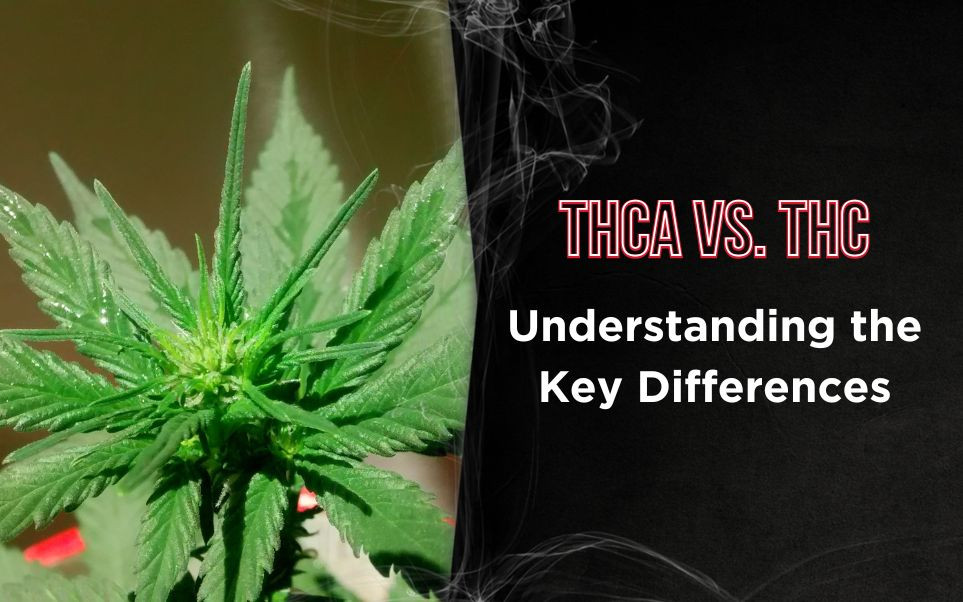THCA vs. THC: Understanding the Key Differences
Estimated 0 min read
When it comes to cannabis and its compounds, few distinctions are as crucial as the difference between THCA (tetrahydrocannabinolic acid) and THC (tetrahydrocannabinol). These two cannabinoids are often confused, but they have distinct properties and effects. If you’re wondering, “What’s the difference between THC and THCA?” or “Is THCA the same as THC?”, this guide will provide all the answers.
Table of Contents
- What Is THCA?
- How Does THCA Become THC?
- Is THCA the Same as THC?
- THCA vs. Delta 9 THC: A Closer Look
- Benefits of THCA
- THCA Wholesale: A Growing Market
- How to Use THCA
- Legal Considerations for THCA and THC
- Final Thoughts: Which One Is Right for You?
What Is THCA?
THCA is a non-psychoactive cannabinoid that naturally occurs in raw cannabis plants. It serves as the precursor to THC, meaning it exists in the plant before THC develops. As cannabis matures, THCA accumulates in the resinous trichomes found on the flower and leaves.
However, unlike THC, THCA does not produce the intoxicating effects associated with cannabis use. This is because THCA has an extra carboxyl group in its chemical structure, preventing it from binding effectively to CB1 receptors in the brain.
How Does THCA Become THC?
THCA converts into THC through decarboxylation, a process that removes the carboxyl group via heat or aging. This can occur through:
- Smoking or Vaping – The heat from combustion or vaporization quickly transforms THCA into THC.
- Cooking or Baking – When cannabis is used in edibles, heat is applied during preparation, activating the THC.
- Sunlight or Time – Over time, dried cannabis naturally loses some of its THCA content, converting into THC.
This explains why consuming raw cannabis will not produce a high, but smoking or vaping it will.
Is THCA the Same as THC?
No, THCA is not the same as THC. While they are chemically related, their effects on the body are quite different.
- THCA is non-psychoactive and must undergo decarboxylation to become THC, the compound responsible for the euphoric and intoxicating effects of cannabis.
- THC interacts directly with the endocannabinoid system (ECS), primarily the CB1 receptors in the brain, producing effects like relaxation, altered perception, and appetite stimulation.
THCA vs. Delta 9 THC: A Closer Look
The term Delta 9 THC is often used interchangeably with THC, but it specifically refers to the activated form of the cannabinoid. Since THCA must be heated to convert into Delta 9 THC, raw cannabis contains almost no Delta 9 THC until it is processed.
| Property | THCA (Raw) | THC (Delta 9, Heated) |
|---|---|---|
| Psychoactive? | No | Yes |
| Binds to CB1 Receptors? | No | Yes |
| Commonly Found In | Raw cannabis, live resin | Smoked, vaped, or cooked cannabis |
| Therapeutic Potential | Anti-inflammatory, neuroprotective, anti-nausea | Euphoria, relaxation, appetite stimulation |
Benefits of THCA
Even though THCA does not cause intoxication, research suggests it has several therapeutic benefits:
- Anti-inflammatory – May help with conditions like arthritis and autoimmune disorders.
- Neuroprotective – Potentially beneficial for neurodegenerative diseases like Alzheimer’s and Parkinson’s.
- Anti-nausea – May help with nausea and appetite loss.
- Antioxidant Properties – Can protect against oxidative stress in the body.
Because of these potential benefits, some cannabis users consume raw cannabis juice or tinctures to take advantage of THCA without experiencing the high of THC.
THCA Wholesale: A Growing Market
With the increasing demand for non-psychoactive cannabis products, THCA flower wholesale has become a popular option for dispensaries and retailers. Many THCA wholesale distributors now provide high-quality THCA-rich cannabis for consumers who want the therapeutic benefits without the high.
Wholesale THCA flower is available through licensed suppliers for those looking to buy in bulk. This allows businesses to offer raw cannabis products to customers interested in alternative wellness solutions.
How to Use THCA
If you want to experience the benefits of THCA without converting it into THC, consider these methods:
- Juicing Fresh Cannabis – Blending raw cannabis leaves and flowers into a smoothie preserves the THCA content.
- THCA Tinctures – Alcohol- or oil-based extracts that retain THCA without applying heat.
- Capsules and Tablets – A convenient way to consume THCA without smoking.
- Topicals – Some skincare and pain relief products include THCA for localized effects.
For those who want THC’s psychoactive effects, they can simply smoke, vape, or cook with cannabis to convert THCA into THC.
Legal Considerations for THCA and THC
Cannabis laws vary significantly by location, and THCA legality depends on local regulations. Since THCA itself is not intoxicating, some jurisdictions allow it under different rules than THC. However, because it can convert into THC, some legal gray areas exist.
For businesses and consumers interested in THCA wholesale, it’s crucial to check state and federal laws before making a purchase.
Final Thoughts: Which One Is Right for You?
If you’re looking for therapeutic benefits without intoxication, THCA may be a great choice. However, if you seek the traditional psychoactive experience of cannabis, THC is the active compound you need.
By understanding the differences between THCA vs. THC, consumers can make informed decisions based on their personal needs and preferences. Whether you’re interested in THCA wholesale for wellness purposes or looking for the euphoric effects of Delta 9 THC, knowing how these cannabinoids work is key to choosing the right product.








